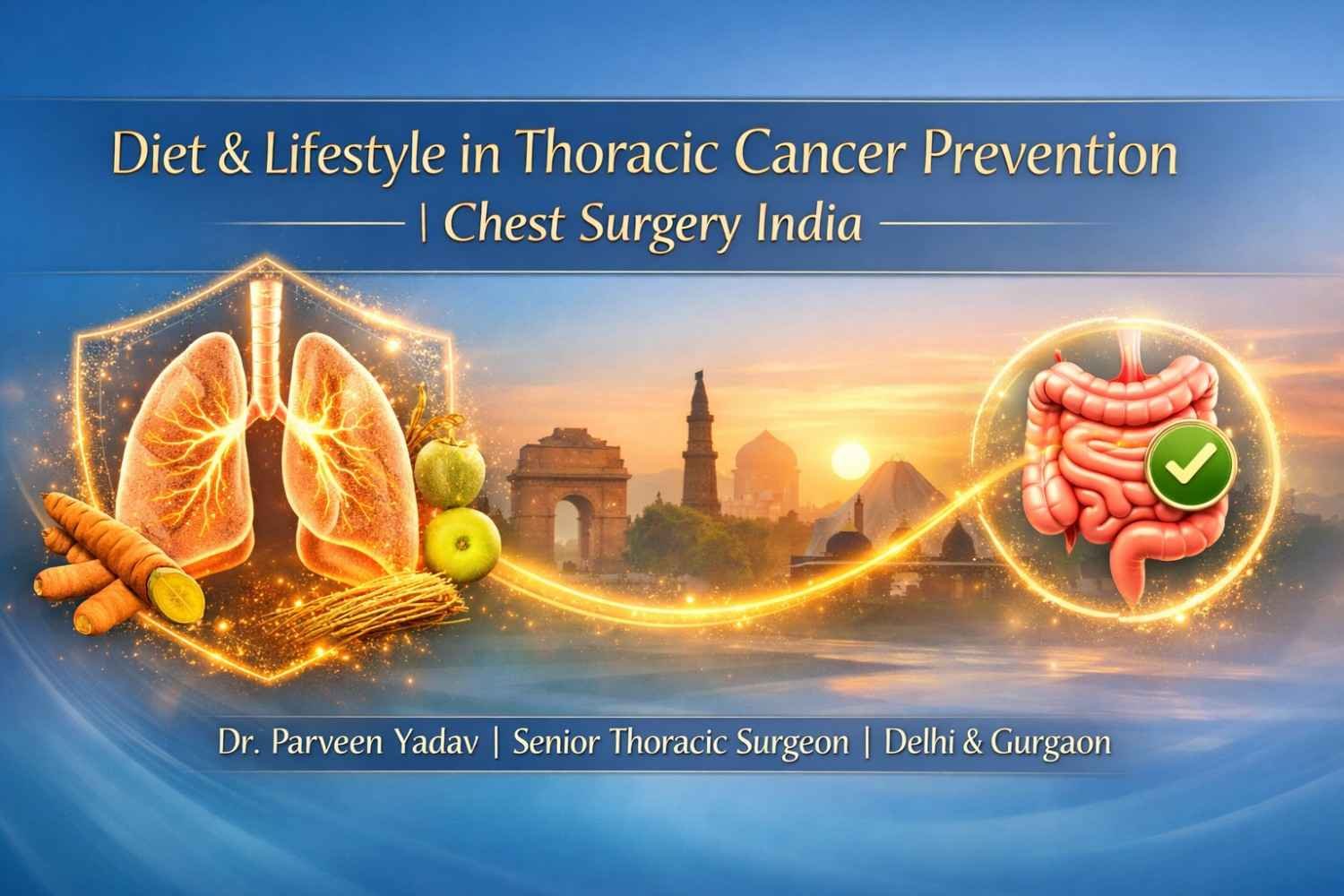

Esophageal cancer is a considerable global health concern, ranking among the top ten causes of cancer-related deaths worldwide. This aggressive disease affects the tube that connects the throat to the stomach, leading to symptoms like difficulty swallowing, chest pain, and weight loss.
Traditional medicines, such as surgery, chemotherapy, and radiation, have long been the mainstays of oesophagal cancer care. However, recent advancements in targeted therapies have opened new avenues, offering more personalised and precise treatment options.
Targeted therapies are a new approach and a beacon of hope in our battle against this challenging disease. They focus on specific molecules or genes in cancer growth, offering a more tailored treatment approach. This blog will dive into how these innovative therapies guide us in a new era of esophageal cancer care, inspiring us with their potential.
Esophageal cancer primarily presents in two types:
Squamous Cell Carcinoma arises in the flat, thin cells lining the esophagus, often in the upper and middle sections. It's more common in regions like Asia and Africa due to risk factors like tobacco use, alcohol consumption, and diets lacking in fruits and vegetables.
Adenocarcinoma originates in the mucus-secreting glands of the esophagus and is usually found in the lower part, closer to the stomach. It is more common in Western countries and is often linked to conditions like gastroesophageal reflux disease (GERD) and obesity.
Despite advancements in early detection and treatment, the prognosis for esophageal cancer remains poor, particularly in advanced stages, underscoring the need for more effective, less invasive treatments.
Targeted therapies represent a cutting-edge approach to cancer treatment. They are prepared to target cancer cells while particularly sparing normal, healthy cells. Distinct traditional therapies such as chemotherapy and radiation, which indiscriminately kill rapidly dividing cells (both cancerous and healthy), have targeted therapies that work by interfering with specific molecules (often proteins) involved in cancer cell growth and survival.
These therapies can:
Block or turn off signals that suggest cancer cells grow.
Control the formation of new blood vessels that supply tumours.
Deliver toxic substances directly to cancer cells without harming normal cells.
Targeted therapies are frequently more effective and less toxic than conventional treatments by focusing on these molecular changes.
Targeted therapies in esophageal cancer exploit the unique characteristics of cancer cells. They identify specific proteins or genes overexpressed or mutated in cancer cells and develop drugs blocking these molecular targets. For instance, therapies may inhibit growth signals within cancer cells, interfere with the formation of blood vessels that feed tumours, or enhance the immune system's ability to destroy cancer cells.
Molecular profiling plays a crucial role in determining the suitability of targeted therapies. It involves testing cancer cells to identify specific genetic mutations or biomarkers these drugs can target. Only patients with tumours with relevant molecular targets will benefit from specific targeted therapies, making this approach highly personalised.
These are lab-made molecules designed to attach to specific targets found on cancer cells. For example, Trastuzumab (Herceptin) targets the HER2 protein, which is overexpressed in some types of esophageal cancer, helping to inhibit tumour growth. Ramucirumab is another monoclonal antibody that targets vascular endothelial growth factor receptor 2 (VEGFR-2), blocking the formation of new blood vessels that supply tumours.
TKIs, like Afatinib and Lapatinib, work by blocking the enzymes known as tyrosine kinases. These enzymes send signals that promote cell growth and division. By inhibiting these signals, TKIs can effectively slow down or halt cancer progression.
Drugs like Pembrolizumab (Keytruda) and Nivolumab (Opdivo) are designed to help the body's immune system recognise and attack cancer cells more effectively. These therapies block proteins (like PD-1 or PD-L1) that stop immune cells from attacking cancer cells, enhancing the body's natural immune response against tumours.
Not all patients are suitable for targeted therapies; the decision depends on several factors:
Type of Cancer: Whether the cancer is squamous cell carcinoma or adenocarcinoma.
Stage of Cancer: Targeted therapies are often used in advanced or metastatic stages where traditional therapies may not be as effective.
Presence of Specific Genetic Mutations: Genetic and molecular testing is essential to identify whether the patient's tumour expresses specific proteins or genetic mutations that these therapies can target.
Patients should consult their oncologists for comprehensive genetic testing and discuss eligibility, risks, and benefits of targeted therapies.
Targeted therapies offer several advantages:
Higher Precision: They specifically attack cancer cells, reducing damage to normal tissues.
Fewer Side Effects: Because they are more selective, targeted therapies generally result in fewer side effects than chemotherapy or radiation.
Improved Outcomes: Studies have shown that targeted therapies can increase progression-free survival and overall survival in certain types of esophageal cancer, providing patients with a longer and better quality of life.
While targeted therapies are generally considered less toxic than traditional treatments, they are not without side effects. Common side effects may include:
Skin reactions such as rashes or dryness.
Fatigue and weakness.
Diarrhea and other gastrointestinal issues.
Hypertension is high blood pressure.
Patients should report any side effects to their healthcare provider immediately to manage them effectively and ensure the continuation of therapy.
The field of targeted therapies for esophageal cancer is dynamic, with numerous clinical trials underway to test new drugs and treatment combinations. These trials represent the promise of the future, exploring innovative approaches like combination therapies and new drug development. They also leverage cutting-edge technologies like artificial intelligence and machine learning to develop more customised treatment plans based on genetic data, offering hope for more effective and personalised care.
Combination Therapies: Combining targeted therapies with immunotherapy or chemotherapy to improve outcomes.
New Drug Development: Research into next-generation inhibitors and monoclonal antibodies that can target a broader range of molecular changes.
Personalised Medicine Approaches: Leveraging artificial intelligence and machine learning to develop more customised treatment plans based on genetic data.
Patients curious about participating in clinical trials should consult with their oncologists to explore available options and eligibility criteria.
Despite their many benefits, targeted therapies also have some limitations:
Development of Resistance: Cancer cells can adapt and develop resistance to targeted therapies over time, necessitating the use of alternative treatments.
Cost and Accessibility: These treatments can be costly, and access may be limited based on geographic location or healthcare policies.
Limited Applicability: Not all esophageal cancers have specific targets for these therapies, limiting their use to a subset of patients.
Ongoing study aims to overcome these challenges by creating new drugs, improving genetic testing, and making therapies more accessible and affordable.
Combining targeted therapies with chemotherapy, radiation, or immunotherapy is becoming increasingly common. This process can improve the effectiveness of cancer treatment by:
Reducing Tumor Resistance: Multiple attack modes prevent cancer cells from developing resistance.
Improving Outcomes: Studies have shown that combination therapies can improve survival and response rates in patients with advanced-stage cancer.
However, combination therapies can also lead to increased side effects, requiring careful management and monitoring by healthcare providers.
The future of targeted therapies is bright, with several promising directions:
Next-Generation Targeted Therapies: These new drugs target a broader range of molecular changes and overcome resistance mechanisms.
Advanced Diagnostics: Improved genetic testing and molecular profiling will enable more personalised treatment plans, increasing the chances of success.
Integration of AI and Machine Learning: These new technologies will be essential in exploring vast amounts of genetic data to recognise the best treatment options for individual patients.
Targeted therapies are transforming the treatment of esophageal cancer by providing more precise, less toxic, and potentially more effective options than traditional methods. As research continues and new therapies emerge, the future looks promising for patients and their families. Dr. Parveen Yadav and the team at Chest Surgery India are at the forefront of integrating these innovative treatments, offering advanced care and hope for esophageal cancer patients.
1. What is targeted therapy for esophageal cancer?
Targeted therapy implicates drugs that specifically target cancer cells while sparing healthy ones.
2. How effective is a targeted therapy for esophageal cancer?
Effectiveness varies but often shows promising results, particularly in cases with specific genetic markers.
3. Can target therapies be used in all stages of esophageal cancer?
Not all stages are eligible; targeted therapies are typically used in advanced or metastatic stages.
4. What are the side effects of targeted therapies for esophageal cancer?
Common side effects include skin reactions, fatigue, diarrhoea, and hypertension.
5. How do I know if I qualify for targeted therapy?
Genetic testing and a discussion with your oncologist can determine eligibility.
Dr. Parveen Yadav is a highly recommended surgeon or specialist for esophageal cancer in Gurgaon, Delhi. He specialises in minimally invasive and robotic thoracic onco surgery. He has been recognised for 18+ years as the best chest surgeon in India for his expertise in treating chest-related (Chest Surgery) ailments, such as Esophageal (Food Pipe Cancer), Lung, Tracheal (Throat), Chest wall tumours, Mediastinal Tumours, Empyema, and Bronchopleural Fistula cancer. With a focus on precision and innovation, he is dedicated to offering exceptional care to his patients, utilising techniques to ensure optimal outcomes.

18+ Yrs Exp | 5,700+ Thoracic & Robotic Cancer Surgeries
Dr. Parveen Yadav is a Director and Senior Consultant in Thoracic and Surgical Oncology, specializing in minimally invasive and robotic lung and esophageal surgeries, with advanced training from AIIMS and Tata Memorial Hospital.
View Full Profile Pain After Thoracic Surgery: Tips for Smooth Recovery
Pain After Thoracic Surgery: Tips for Smooth Recovery
 Diet & Lifestyle for Thoracic Cancer Prevention | Dr. Parveen Yadav
Diet & Lifestyle for Thoracic Cancer Prevention | Dr. Parveen Yadav
 Robotic Thoracic Surgery: How Da Vinci Technology is Revolutionizing Chest Procedures
Robotic Thoracic Surgery: How Da Vinci Technology is Revolutionizing Chest Procedures
Struggling with pain after chest surgery? Dr. Parveen Yadav shares expert recovery tips, causes of shoulder pain, PTPS signs, and what your discharge sheet won't tell you.
Discover how diet, breathing exercises & daily habits help prevent and recover from thoracic cancer. Expert insights from Dr. Parveen Yadav, Chest Surgery India
Discover how Da Vinci robotic surgery is transforming chest procedures in Gurgaon. Less pain, faster recovery & expert care by a certified thoracic surgeon
Copyright 2026 © Dr .Parveen Yadav all rights reserved.
Proudly Scaled by Public Media Solution!